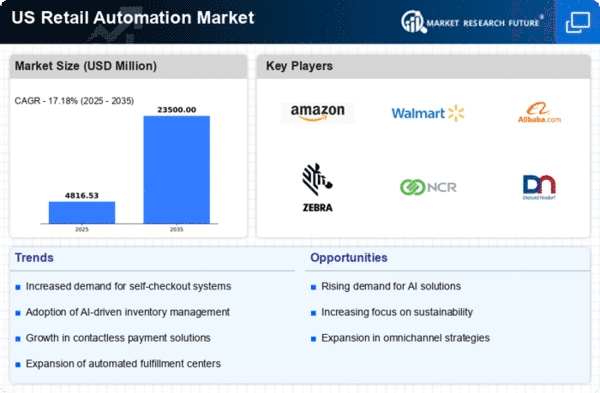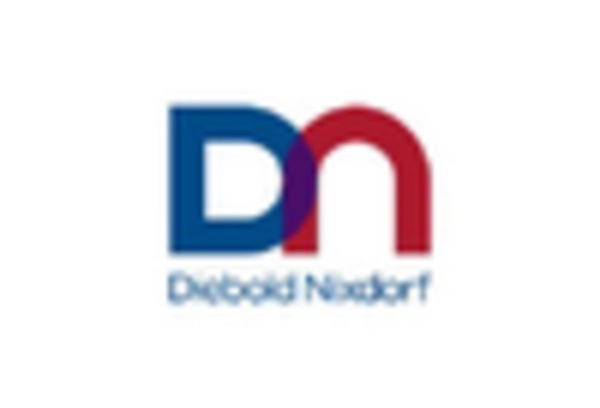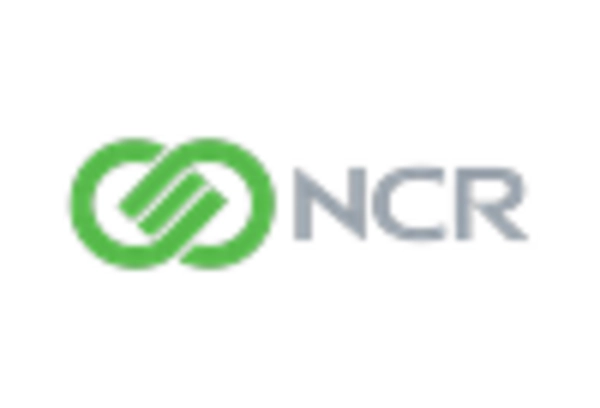Labor Shortages and Workforce Challenges
Labor shortages and workforce challenges are emerging as critical drivers in the retail automation market. The retail sector is facing difficulties in hiring and retaining staff, which has led to an increased reliance on automation to fill gaps. Retailers are turning to automated solutions to maintain service levels and operational efficiency in the face of these challenges. For instance, automated inventory management systems can reduce the need for manual labor, allowing businesses to operate effectively with fewer employees. This trend is expected to continue, as the retail automation market adapts to the evolving workforce landscape and seeks to mitigate the impacts of labor shortages.
Rising Demand for Operational Efficiency
The retail automation market is experiencing a notable surge in demand for operational efficiency. Retailers are increasingly seeking solutions that streamline processes, reduce labor costs, and enhance productivity. According to recent data, automation technologies can lead to a reduction in operational costs by up to 30%. This drive towards efficiency is compelling retailers to invest in automated systems, such as inventory management and checkout solutions. As competition intensifies, the need for faster service and reduced wait times becomes paramount. Consequently, the retail automation market is expected to grow as businesses prioritize investments in technologies that promise to optimize their operations and improve customer satisfaction.
Regulatory Compliance and Safety Standards
Regulatory compliance and safety standards are increasingly influencing the retail automation market. Retailers are required to adhere to various regulations regarding safety, data protection, and operational practices. Automation technologies can assist in meeting these compliance requirements by providing accurate data tracking and reporting capabilities. For example, automated systems can ensure that inventory levels are maintained in accordance with safety regulations, reducing the risk of stockouts or overstock situations. As regulatory pressures mount, the retail automation market is likely to see growth as businesses invest in technologies that help them navigate compliance challenges while enhancing operational efficiency.
Technological Advancements in Retail Solutions
Technological advancements are significantly shaping the retail automation market. Innovations in robotics, artificial intelligence, and data analytics are enabling retailers to implement sophisticated automation solutions. For instance, the integration of AI-driven analytics allows for real-time inventory tracking and demand forecasting, which can enhance supply chain efficiency. The market for retail automation is projected to reach $30 billion by 2026, driven by these technological innovations. Retailers are increasingly adopting automated checkout systems and smart shelves, which not only improve operational efficiency but also enhance the shopping experience. As technology continues to evolve, the retail automation market is likely to expand further, offering new solutions to meet the changing needs of consumers.
Consumer Preference for Enhanced Shopping Experiences
Consumer preferences are shifting towards enhanced shopping experiences, which is driving the retail automation market. Shoppers are increasingly favoring convenience and speed, prompting retailers to adopt automation technologies that cater to these demands. For example, self-checkout systems and mobile payment solutions are becoming commonplace, allowing customers to complete transactions quickly and efficiently. Research indicates that 70% of consumers prefer shopping at stores that offer automated services. This trend is compelling retailers to invest in automation to meet consumer expectations and remain competitive. As the retail landscape evolves, the focus on customer experience will likely continue to propel the growth of the retail automation market.
















